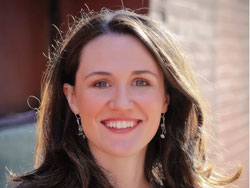Filed Under > TC People
From Homeless to a Home at TC
Liz Murray made it to Harvard after living on the street. Now she's come to Teachers College to learn to help others
Murray’s story is so powerful that it inspired the Lifetime TV movie, Homeless to Harvard in 2003, with Thora Birch in Murray’s role. Murray subsequently built a career as a motivational speaker and trainer, aiming to teach others to overcome seemingly insurmountable obstacles. In 2010 she published a best-selling memoir, Breaking Night, which landed her on Oprah, only heightening her fame. (Watch Murray discuss her book.)
Yet something was missing, says Murray. Harvard wasn’t easy for her. She struggled with the academics and culture, taking nine years to complete coursework that was repeatedly interrupted by constant travel to give workshops and speeches. She wanted the tools to take her calling to a higher level. “It was always in the back of my mind to go back to school,” she says. “To be a psychologist, a practitioner.”
In August 2012, Murray read a New York Times feature on work being done at the intersection of psychology and spirituality by Lisa J. Miller, Professor of Psychology and Education and head of TC’s Spirituality and Mind-Body Institute.
“It totally caught my attention,” says Murray, who entered the master’s program in clinical psychology this semester and plans to ultimately pursue a doctorate.
“I’ve had what I consider a deeply spiritual experience of transformation. And when I do workshops people right in front of me have what I consider to be a spiritual experience, connecting with a higher power in their lives.”
The New York Times’ account of the workshops that Miller and her team conduct with homeless teenagers at Covenant House resonated profoundly with Murray, and not just because she has served on that organization’s board.
“I understand what it’s like when you lose any parental support and you have no place to live,” Murray says. “You’re without an anchor in the world. That’s a big deal.
“I would have this dark thought: If I died on this bench, in this hallway, what would change in the world? You feel your existence has no consequence, and that’s the worst thing for anyone to feel. These youth all have something to contribute. They’re beautiful and brimming with talent, it’s that just these bumps have come into their lives. I’ve been there.”
Murray’s firsthand experience of those bumps put her in the position to become a kind of healing practitioner with virtually no formal training.
“I started speaking when I was 19, and doing workshops when I was 22,” she says.
Very quickly, she found herself entrusted with tasks that carried great responsibility -- for example, giving advice to a suicidal teenager, or helping people at a school or company work through conflicts.
Her workshops were “in the land of self-help — I’m aware of how hokey that can be.” Yet she encountered people seeking answers to their deepest questions, and she saw them make themselves truly vulnerable.
“They’re looking at me, or whoever is coaching the room, to take what they have given and help them,” she says. “That’s a lot of trust, and I need to be fully trained to serve people the best.”
At TC, Murray is excited to learn from scholars who can take her “beyond the anecdotal, and use rigorous research methods.” She says that in addition to Miller’s work, research on grieving and resilience by George Bonanno, Professor of Psychology and Education, also struck a chord.
She has signed up for classes with both Miller and Bonanno, and she will join Miller’s Covenant House project team. “I have a deep curiosity in my heart, and I cannot wait to learn this information and join this community of people,” she says.
The sadness in Murray’s life did not end when she went to Harvard and became famous. In 2006, her father, too, died of AIDS. But she has now made a family of her own, with a loving partner and two young children.
“People hear about my life and feel really sorry for me,” she says. “But I look at my life and see so many blessings. And now I get to study what I’m passionate about.”
Published Thursday, Sep. 5, 2013
